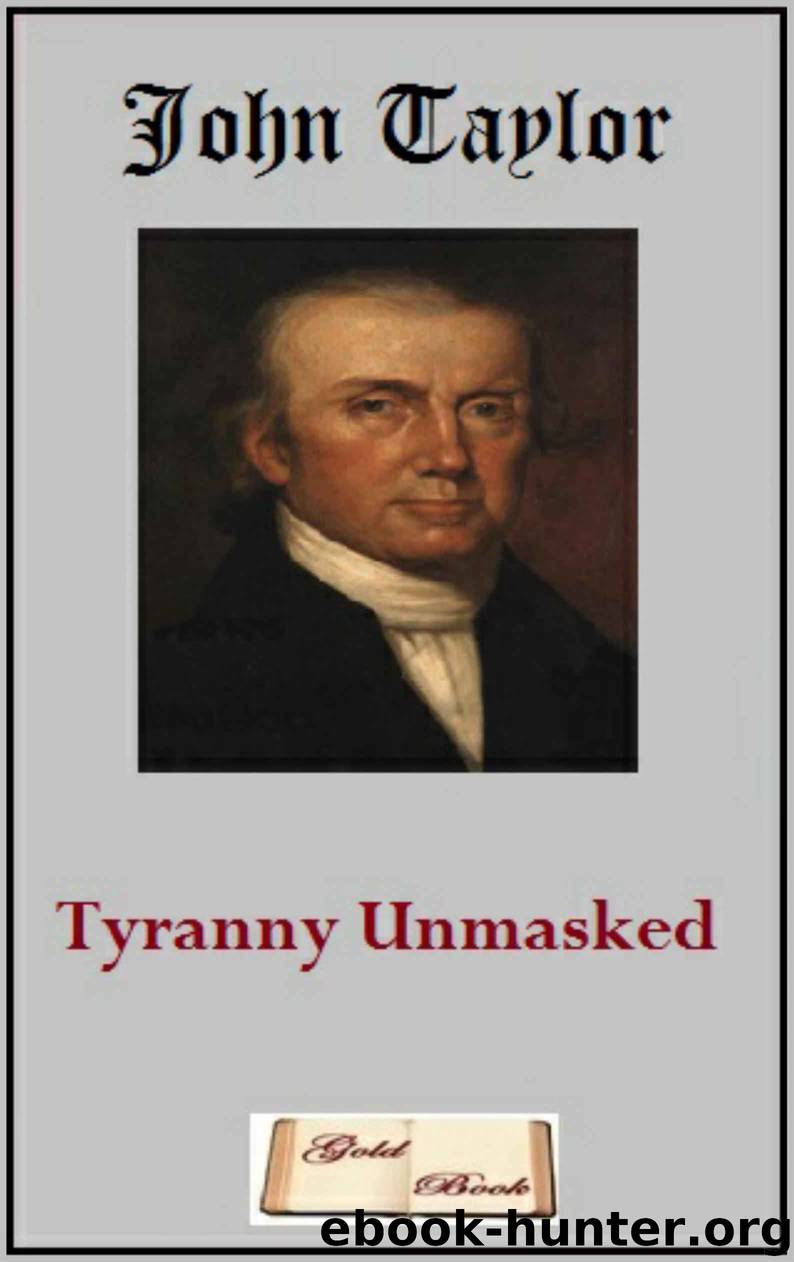Tyranny Unmasked (Illustrated) by Taylor John

Author:Taylor, John [Taylor, John]
Language: eng
Format: epub
Publisher: Gold Books
Published: 2015-03-08T16:00:00+00:00
Section Two
Arguments Against the Protecting Duty Summarized Through an Analysis of Its Major Consequences, continued (Part 2)
7. Destroy Revenue
2.31
This objection, like several others, is mis-stated. It means that protecting duties impair the productiveness of revenue duties, and not that they will destroy other sources of revenue; and that the very consequence will ensue which the Committee think so desirable, namely, a resort to unlimited excises and other internal taxes, in order to supply the deficiency. This consequence is the evil deprecated by the objection, and the Committee admit that it will ensue, and justify it as a blessing, because it will enable us to rival the masterly policy, by which Britain is enabled to extract an enormous revenue from a few people.
2.32
They rest their preference of excises over duties upon a single comparison, from which they deduce an equality between them in that one respect, and exclude from their consideration every sound argument disclosing the disparities between the two modes of taxation. They suppose that the preference of duties to excises, rests solely on the notion, that one mode is less compulsive and more avoidable than the other; and contend, because both are avoidable by submitting to privations, that the two modes are perfectly equal in this problematical or humble merit. It might be contended that even this imperfect test chosen by the Committee, is insufficient to establish an equality so destitute of importance, because it is evidently easier to forbear the use of foreign luxuries than domestick necessaries; but waving this undoubted fact, it is sufficient to recollect that the comparison is wholly delusive. Neither duties nor excises are avoidable; if they were, they could not be relied upon for revenue. Both will operate as a general tax, and if some evasions by particular subterfuges may be practised under both modes of taxation, these confer no benefit upon those who pay the tax. The Committee admit that excises, at least, are a compulsory mode of taxation, by contending that they may be relied upon for a revenue. But let us enquire if other comparisons, more substantial, between the two modes of taxation, do not exist. The collection of duties is less expensive than the collection of excises; therefore the people must pay a larger sum by one mode than the other, to place the same amount in the treasury. To provide objects for excises to operate upon, bounties to an enormous extent must be paid to capitalists; thus the amount paid by the people, compared with what the treasury will receive, may possibly be doubled. Excises are keys to every lock, and penetrate like foul air into every recess; duties leave our homes unviolated, and our quiet undisturbed by the eternal intrusions of vulgar officers hunting for penalties or bribes. Duties are liable to the limitations of the importation, which cannot long exceed the demand; of an ability to pay which is the only lasting source of demand; and of the check arising from a certain degree of moderation to make them productive; excises are liable to no such limitations, and may be pushed to any extent.
Download
This site does not store any files on its server. We only index and link to content provided by other sites. Please contact the content providers to delete copyright contents if any and email us, we'll remove relevant links or contents immediately.
The Secret History by Donna Tartt(19088)
The Social Justice Warrior Handbook by Lisa De Pasquale(12190)
Thirteen Reasons Why by Jay Asher(8909)
This Is How You Lose Her by Junot Diaz(6886)
Weapons of Math Destruction by Cathy O'Neil(6279)
Zero to One by Peter Thiel(5802)
Beartown by Fredrik Backman(5754)
The Myth of the Strong Leader by Archie Brown(5507)
The Fire Next Time by James Baldwin(5444)
How Democracies Die by Steven Levitsky & Daniel Ziblatt(5218)
Promise Me, Dad by Joe Biden(5153)
Stone's Rules by Roger Stone(5088)
A Higher Loyalty: Truth, Lies, and Leadership by James Comey(4963)
100 Deadly Skills by Clint Emerson(4925)
Rise and Kill First by Ronen Bergman(4788)
Secrecy World by Jake Bernstein(4753)
The David Icke Guide to the Global Conspiracy (and how to end it) by David Icke(4718)
The Farm by Tom Rob Smith(4509)
The Doomsday Machine by Daniel Ellsberg(4490)
